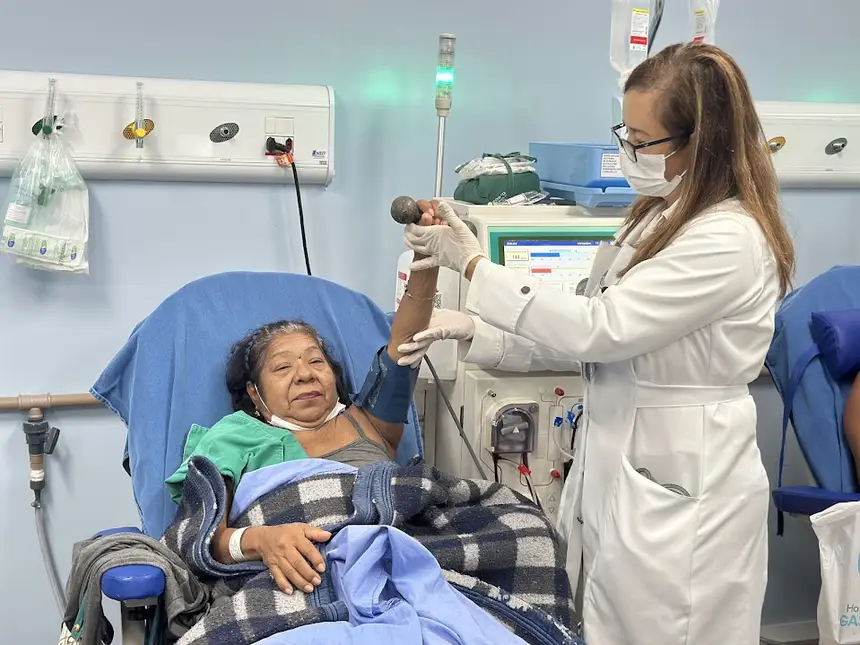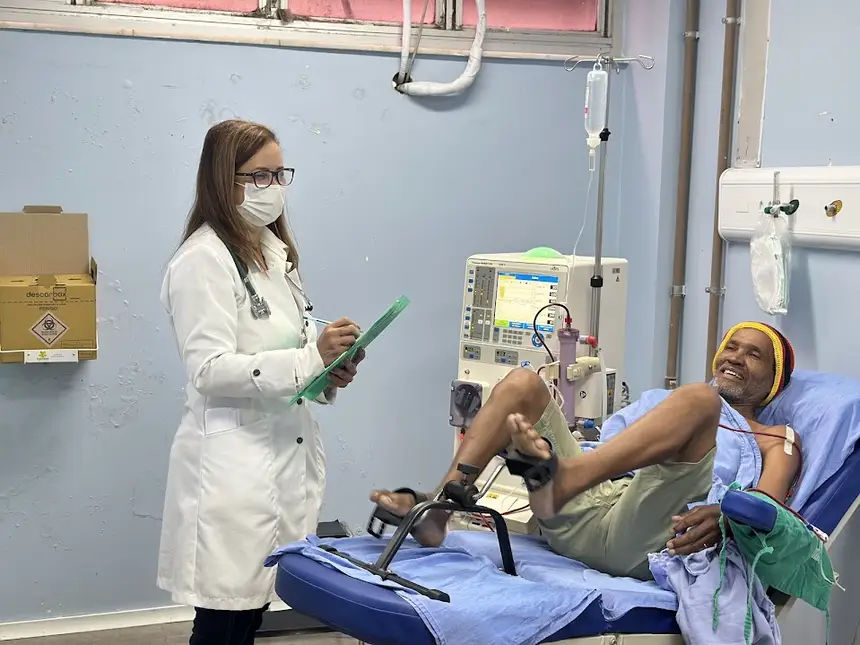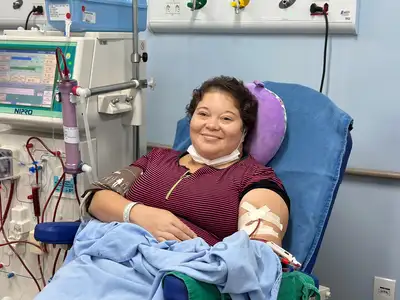Physiotherapy Service at the Hospital de Clínicas Promotes Well-Being for Hemodialysis Patients
Intradialytic care has positive impacts on mobility, self-esteem, and quality of life for people with chronic kidney diseases

For those living the challenging routine of hemodialysis, climbing a staircase or walking to the pharmacy can represent a significant achievement. In this context, physiotherapy is a great ally in promoting the physical and emotional health of patients at the Gaspar Vianna Hospital de Clínicas (HC) in Belém, with impacts far beyond the clinical environment.
Established in August 2024, the HC Intradialytic Physiotherapy Service promotes well-being and better quality of life for patients undergoing hemodialysis treatment. The initiative allows patients to perform physical exercises during treatment at the clinic, contributing to the prevention of deformities, relief from pain, and improvement in physical conditioning.
Physiotherapist Giane Warken, who is responsible for the Service, informs that the care aims to combat the effects of immobility during sessions, which last, on average, three and a half to four hours. “Physiotherapy during hemodialysis helps reduce cramps, pain, and fatigue, in addition to aiding in rehabilitation and preventing physical disabilities,” explains the professional.
She states that currently, the HC Hemodialysis Service serves 59 patients, of whom 60% have associated heart diseases. The remaining 40% have comorbidities such as hypertension and diabetes, which can also progress to heart diseases. According to the professional, “this makes physiotherapeutic follow-up even more essential.”
Resources such as aerobic and resistance exercises are used, employing elastic bands and a cycle ergometer – a type of adapted stationary bike. “We have patients who perform 20 to 30 minutes of exercises per session. The literature already proves the benefits of these practices for quality of life,” informs Giane Warken.

Guidance - In addition to physical activity during hemodialysis, patients receive guidance for self-care at home. “We teach how to care for the arteriovenous fistula, which is the access used during hemodialysis, and promote the maintenance of muscle strength, sensitivity, and functionality of the hands and arms,” adds the physiotherapist.
The team also conducts sensory and motor evaluations, such as sensory mapping, helping the patient identify areas with numbness or loss of sensitivity, and offering stimuli to recover these functions.
Body and Mind - The physiotherapist is integrated into a multidisciplinary team and seeks to address the patient considering the emotional aspect as well. “Many of our patients face pain, tension, and even depression due to the routine of hemodialysis and their own physical limitations. Therefore, mental health is part of our care,” says the physiotherapist.
The care considers the biopsychosocial aspect of patients, promoting comprehensive care. According to the professional, active patients are more motivated to face the treatment routine. “We receive reports from patients who have started walking more, climbing stairs, and feel less tired in their daily lives,” reports Giane Warken, adding that better physical disposition directly reflects on patients' self-esteem and motivation. “They come in saying: ‘I couldn’t leave the house before; now I can go shopping and come back alone.’ This shows us that physical activity has a direct impact on quality of life,” she assures.

Strengthening - Patient Jarina Beatriz Cardoso, 36 years old, who has been treated at HC for 11 years, shares the importance of physiotherapy in her routine. “I like doing physiotherapy because it is necessary for us to do physical activity. It is a job done with great excellence, and it is also necessary because we leave here very weak. Then physiotherapy helps a little more to strengthen our legs and arms. It’s good for us to move a little. And it’s very good that, thank God, we also have this physiotherapy treatment, which is very good. The professionals are also very good. They take care of us very well, with love and care,” says Jarina Cardoso.
Physiotherapy also helps patients gain more autonomy. Patient Sandra do Socorro Costa, 58 years old, a resident of Marituba (in the Metropolitan Region of Belém) and a chronic kidney patient for four years, evaluates the Service as an important complement to clinical treatment. “I evaluate the work of physiotherapy as a good thing within our treatment. At home, it is difficult for us to do any activity, but sometimes I do respiratory activity, and I can also walk alone; I even go to Ver-o-Peso by myself, which I didn’t do before,” says the patient.

The HC Intradialytic Physiotherapy Service is still in the adoption phase but already shows high acceptance among patients, who reported improvements in physical and emotional well-being, according to an internal satisfaction survey. In the next stage, the Hospital intends to evaluate long-term results based on clinical and laboratory tests.
Text: Kelly Barros - Ascom/HC









